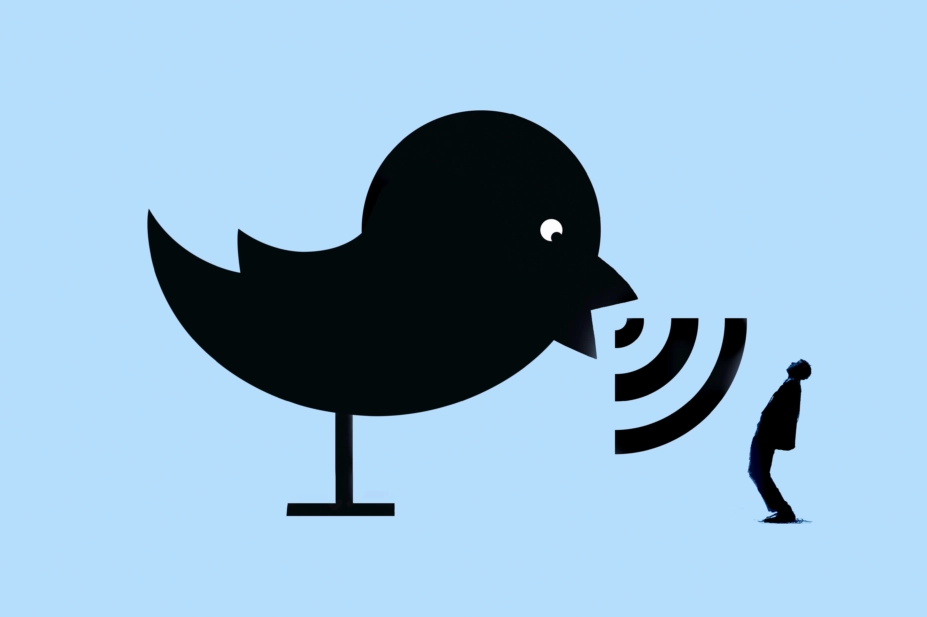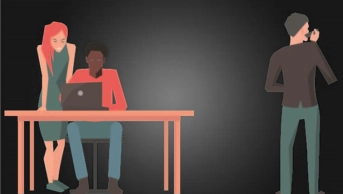
Contributor: Ikon Images / Alamy Stock Photo
The problem
A pharmacist colleague has recently posted online about a project they are currently leading on at work. One of the comments in response to their post is from a pharmacist. The comment is rather negative and leaves your colleague feeling personally attacked.
What would you advise your colleague to do? Where should they go for advice and support?

Source: Courtesy of Sureena Sharma
‘Don’t lose enthusiasm because of the situation’
I would first read the comments that were written. Sometimes when we read comments online, it’s hard to gauge the intended tone. Occasionally, people can be very direct in their writing, which comes across as negative when that wasn’t the intention. I would also ask my colleague if they know this pharmacy professional. If the answer is no, then I would remind them that the individual who wrote those comments doesn’t personally know them. If the critic doesn’t know their strengths, qualities or positive attributes, why should they concern themselves with what this person is saying?
This can be easier said than done, but I would remind my colleague that the words written by the individual are just their opinion. While it may not be kind, it isn’t worth fixating on the negatives and forgetting all the hard work and excitement that my colleague has for their project. I would also suggest blocking them from being able to comment on future posts if they continued to write comments that appeared to be a personal attack. Being behind a keyboard doesn’t give them a reason to be unkind in what they say. As long as my colleague and the team involved are proud of the work they are doing and don’t lose enthusiasm because of the situation, that’s all that really matters.
Sureena Sharma is a learning and development pharmacist at the National Pharmacy Association. She also has a YouTube channel — ‘Sureena Speaks’ — aimed at supporting the learning needs of undergraduate, preregistration and newly qualified pharmacists (as well as anyone else interested in knowing more about pharmacy and medicines)

Source: Courtesy of
Aditya Aggarwal
‘It is better to not provoke such an individual and risk your own integrity and professionalism’
First, I would take a break; walk away or do something else for a few minutes. You should not act reactively when you feel threatened, but you should take time and reflect.
The online comment could be factually correct, but written in an unprofessional tone. One flaw of social media lies in the inability to accurately depict the desired tone. What could be meant as a joke, when written in ‘social media speak’ could be interpreted negatively. In any case, it is important not to respond in a similar manner. The best course of action may be to respond professionally and acknowledge the pharmacist’s comment or simply ignore it.
If the comment is factually incorrect and clearly a personal attack, there may be a hidden agenda behind the comment that you are unaware of. The comment could be the result of a completely unrelated matter or general disgruntlement. In this case, it is better to not provoke such an individual and risk your own integrity and professionalism. At this stage, I would seek advice from a more senior colleague on the project, or line manager. Throughout any of this, should you feel you need to speak to someone impartial, you can always reach out to Pharmacist Support or the General Pharmaceutical Council (GPhC) for further advice.
No matter how you respond, you should always conform with the GPhC guidance ‘Demonstrating professionalism online’. Online bullying can cause people to react instantaneously, which may damage your own reputation in the process.
Aditya Aggarwal is a pharmacist and is currently in his final year of the policy and strategy stream of the NHS Graduate Management Training Scheme

Source: Courtesy of Andrea James
‘Many people feel free to be abusive online and behave in ways they never would in real life’
Social media provides an excellent forum for pharmacy professionals to network, share information, learn from others and publically promote the profession. However, the main downside of social media is that, from behind the anonymity of their computer, many people feel free to be abusive online and behave in ways they never would in real life.
The standards set out within the GPhC’s ‘Standards for Pharmacy Professionals’ apply at all times, in both the real and online worlds. Even online, pharmacy professionals must act professionally, treat people with respect and maintain appropriate professional boundaries.
If their comment was discriminatory or grossly inappropriate, you might wish to report the matter to the GPhC. Such complaints are taken seriously by professional regulators. For example, in July 2018, a solicitor was suspended from practice for 18 months as a result of tweeting offensive comments about the Muslim, Jewish and Catholic faiths.
If, on the other hand, the other pharmacy professional’s comment simply expressed their disagreement with or lack of regard for the project, you could chalk the matter up to experience and note for future reference that a thick skin is required before exposing yourself to the scrutiny and potential negativity of social media.
Another option would be to contact the other pharmacist privately, explain how their comment made you feel and ask them to delete it.
I would also suggest discussing the situation with a trusted colleague or manager. You might be surprised how many people have experienced similar events on social media. If you would prefer to speak to someone anonymously, Pharmacist Support’s Listening Friends service is available on 0808 168 5133.
Andrea James is a partner at law firm Brabners LLP and specialises in healthcare regulation and professional discipline law

Source: Royal Pharmaceutical Society
‘Anything said online can be copied, distributed and taken out of context’

Source: Courtesy of Sabes Thurairasa
Engaging with social media can be worthwhile for pharmacy professionals; it is an accessible and fast way to find out information and help you develop your practice and career. The GPhC’s ‘Standards for pharmacy professionals’ set out the behaviours, attitudes, qualities and attributes that are expected of pharmacy professionals.
Some of the possible options after receiving negative online comments are:
- Contacting the Royal Pharmaceutical Society (RPS) Professional Support Service. Here, a team of pharmacists and pharmacist advisers can provide confidential, one-to-one professional advice and talk through your options and help you decide your next steps;
- Using the RPS social media toolkit. This gives top tips for using social media and discusses social media ethical and professional challenges;
- Talking the situation through with someone so you don’t feel isolated. Pharmacist Support offers a listening friends service, through which you can discuss any issues or concerns, such as bullying, in confidence and anonymously. There is also a bullying factsheet from Pharmacist Support that looks at what bullying is, how to deal with it and how to get support;
- Reading the GPhC’s ‘Guidance on raising concerns’ and looking at the possible options;
- Challenging the behaviour of the pharmacist in an open and professional manner. Standard 8 of the GPhC’s ‘Standards for pharmacy professionals’ advises on how to speak up about your concerns. Perhaps getting in touch with the pharmacist and highlighting the relevant guidance, such as the RPS social media toolkit and the GPhC’s ‘Demonstrating professionalism online’, which looks at the ‘Dos and Don’ts’ of social media, could help the pharmacist become more aware of their actions and the impact they have on the pharmacy profession in general.
Anything that is said online can be copied and distributed, and can be taken out of context. In its professional standards, the GPhC asserts that pharmacists have the same responsibilities when interacting online as they do in face-to-face interactions. The actions of pharmacy professionals online can have an impact on both the pharmacy profession and undermine the public’s confidence and trust. It is important to think about expectations and perceptions of patients, colleagues and employers when using social media, but also in this case the future generation of pharmacists.
Yogeeta Bhupal is a professional support pharmacist at RPS Support who is also a part-time clinical pharmacy lecturer.
Sabes Thurairasa is a senior RPS professional support pharmacist with experience in academia and community pharmacy.



